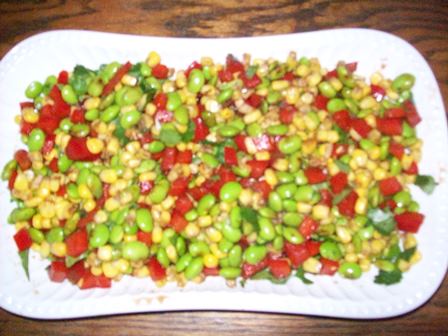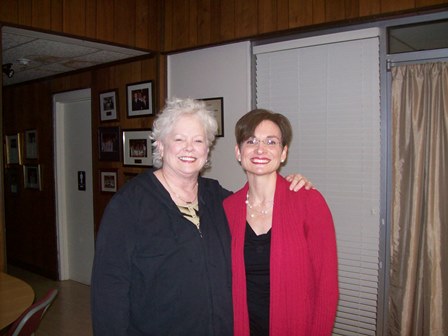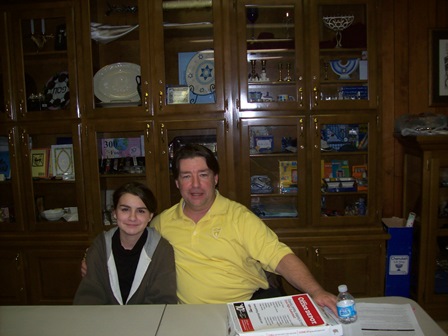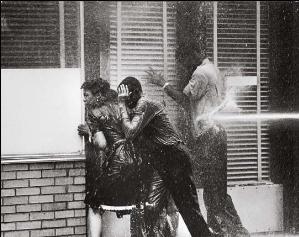When I was a young girl, I read the “Little House” books by Laura Ingalls Wilder over and over and over again. I have a complete set of her books atop a bookcase in my Huntsville home. I can plop down on my couch anytime and re-read about the life of great integrity lived by Laura and her pioneer family. Perhaps my affinity with Laura comes from the fact that we were both born in the Great State of Wisconsin. “Little House in the Big Woods” is my favorite book authored by her, which chronicles her early life in the Wisconsin woods.
Last Thursday night Adam and I experienced what life was like in Laura Ingalls Wilders time. The Burritt on the Mountain museum had a fundraising dinner where participants could have dinner served in the log cabins located on the property. My group was escorted to by Mr. and Mrs. Beebe to the Eddins House log cabin, which is thought to be the oldest surviving log structure in Alabama. It was a COLD late fall Alabama evening and an almost-full moon and big stars formed a beautiful canopy over us. Mr. and Mrs. Beebe were dressed in 1800’s attire and carried lanterns to light our way in the dark night. What a magical walk!
The cabin was heated only by the fire in the fireplace. Mr. and Mrs. Beebe served us a Southern Christmas themed dinner of Brown Sugar Glazed Baked Ham, Brandied Peaches (an actual 18th century recipe was used), Roasted Sweet Potatoes, Mixed Bean and Corn Hopping John, Cornbread Muffins, and Cream Cheese Poundcake with Chocolate or Praline Sauce (Mouthwatering Good!) Of course, there was no light in the cabin and the only light came from the firelight and candles on the table. Great conversations were had with Peggy and Gus, Donna and David, and Joyce and John…couples we had just met and who came for the same reason we did. They also wanted to get a feel for what it was like living in the 1800’s.
Well, what was it like for Adam and I to “spend and evening in the 1800’s?” It was SO MUCH FUN, but COLD! I have no idea how our forefathers survived the winters. Adam and I wore thick winter jackets purchased in Wisconsin and hats, and we still got cold. Our feet were numb when we returned to our home with indoor heating, which I appreciate so much more after that evening!
Here is a recipe I would like to share as a tribute to our pioneer ancestors:
CENTRAL PLAINS SUCCOTASH
2 Tablespoons balsamic vinegar
2 Tablespoons cider vinegar
1 Tablespoon brown sugar
1/2 teaspoon ground cumin
1/2 teaspoon onion powder
1 clove garlic, minced
1 1/2 cups cooked edamame (shelled fresh or frozen soybeans)
1 1/2 cups cooked fresh corn kernels, or drained canned corn, or frozen
1/2 cup chopped red bell pepper
1/3 cup cilantro
Combine the balsamic and cider vinegars, brown sugar, cumin, onion powder, and garlic in a 1- to 1 1/2 quart saucepan. Heat over medium heat about three minutes, or until the sugar dissolves. Remove from heat.
Place the edamame, corn, and red bell pepper in a medium-size bowl. Pour the vinegar mixture over the vegetables. Stir to mix. Cover and refrigerate 1 to 4 hours or until chilled, stirring once.
Stir in the cilantro just before serving. Serve chilled.
Serves four. Serving size: 3/4 cup
Did you know succotash derives from the Eastern Narragansett Indian word msickquatash, meaning “bolied whole kernels of corn?”
Recipe provided courtesy of John Wiley and Sons. From the American Dietetic Association Cooking Healthy Across America by American Dietetic Association and Food and Culinary Professionals, a Dietetic Practice Group of the Academy of Nutrition and Dietetics. Copyright 2005. John Wiley and Sons. p. 237
CENTRAL PLAINS SUCCOTASH – COLONIAL, COLORFUL, AND CRAZY-GOOD!




